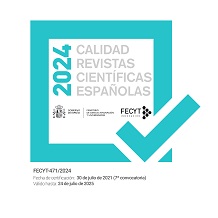MANAGEMENT BY AREA: A MODEL FOR THE MANAGEMENT OF HUMAN RESOURCES IN HEALTH ORGANIZATIONS.
Abstract
The management for competences constitutes a model of participation and an adaptable stimulus to the career of the health professional. It is an integral model of management of the human resources that contributes, detecting, acquiring, promoting and developing the competences that give an extra value to the organization and for this reason this model is unique in this field of management. It proposes a management style in which the human factor is a priority and every person must contribute with their best skills to the organization. The aims we have proposed are to extend a new model of direction in the health organization, make the readers aware of the importance and impact of the management for competences and contribute with a global and integral vision knowing the specific tools of the management of human resources for competences. The model we are presenting in this paper is considered as one of the most appropriate for the current period. It is a way to fight the daily challenges in such a way that it makes it possible to train the intellectual capital of institutions and organizations. In general most of the companies and especially health organizations do not invest enough in the development of their teams, for reasons like the lack of systematized strategies for the evaluation of performance, or the unawareness of the importance of training the intellectual capital as a key factor.Downloads
-
Abstract3795
-
PDF (Español (España))2081
The works published in this magazine are subject to the following terms:
1. The Publications Service of the University of Murcia (the publisher) preserves the copyright of the published works, and encourages and allows the reuse of the works under the license for use stated in point 2.
© Servicio de Publicaciones, Universidad de Murcia, 2011 (© Publications Service, University of Murcia, 2011)
2. The works are published in the electronic edition of the journal under Creative Commons Reconocimiento-NoComercial-SinObraDerivada 3.0 España(texto legal) “ a Attribution-NonCommercial-NoDerivatives 3.0 Spain license (legal text)”. They can be copied, used, broadcasted, transmitted and publicly displayed, provided that: i) the authorship and original source of their publication (journal, publisher and URL) are cited; (ii) are not used for commercial purposes; iii) the existence and specifications of this license is mentioned.
3. Conditions of self-archiving. Authors are allowed and encouraged to electronically disseminate the pre-print (pre-reviewed ) and / or post-print (reviewed and accepted for publication) versions of their works prior to publication, as it ensures a wider circulation and dissemination which may lead to a possible increase in its mention and a higher scope among the academic community. RoMEO color: green.













